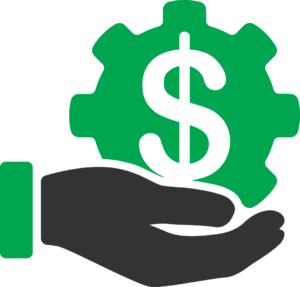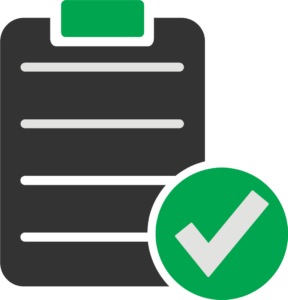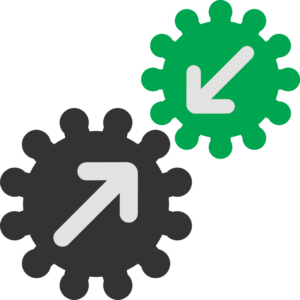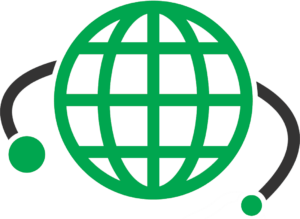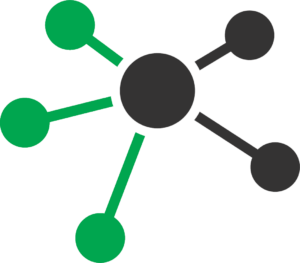What is CRM?
CRM (Customer Relationship Management) enhances sales and customer interactions by organizing lead and data, tracking sales, managing relationships, and automating the sales cycle.
Your customers are like gold for your small business! As you grow, you’ll want a special place where your sales team can find all the info about customers and take care of relationships. That’s where these systems come in – they’re like magic tools that help businesses handle customer stuff and make sales plans that work.
CRM is not ERP
CRM helps your sales team talk to customers, make sales smoother, and keep customers happy. It’s like having a cool book with details about people and companies (we call that contact management). An ERP is a system that manages business resources, like finances, inventory, and employees.
CRM
More contacts within a company
Contact history
Sales pipeline
Reporting
and much more!
Excel
E-mail
Phone
Website
Street address
Customer type
How CRM works
CRM is a great tool that helps businesses remember their customer relationships and manage sales.
When a business is small, they might use things like excel sheets or email boxes. But when a business grows big, it becomes tough to keep everything organized. That’s when this system steps in – it’s a helpful way to make sure everything is in order and works smoothly.
CRM makes it easy to manage a sales process, plan tasks, such as a follow-up with new leads, and tracking what kind of responses have (or haven’t) worked so far.
When using Excel, you arrange information side by side. In a CRM solution, you can connect data to see various perspectives and relationships.
Without CRM?
Remember, it isn’t just for sales – it’s helpful for all parts of a business. To prevent losing info, forgetting meetings, and understanding customer needs, we need it.
The more time a business spends on paperwork, the less time they have for other important things. When a sales team is busy talking to customers and getting information, it can create a lot of work.
Salespeople often meet customers outside the office and get helpful info. But sadly, this info isn’t always kept in one place, which makes it hard to find and use.
Customers can reach out to a business in various ways. They can ask questions, check on orders, or report problems. If there’s no CRM, it might take a while to answer, and that can make customers unhappy.
Even if you manage to gather data, it can be hard to understand it and get useful insights from it. Sometimes bosses don’t know what their teams are doing, which can cause confusion about who should do what.

Key Benefits
A Customer Relationship Management software is a helpful tool for sales. It helps manage customer relationships, track conversations, and analyze customer information. It’s useful for sales teams to work together on talking to customers and keeping up with them.
Marketing teams can see if customers like their campaigns. Any team that talks to customers can use it to give great service. CRMs also show businesses interesting stuff about how customers behave and what they like. This helps businesses make things that customers want even more.
Customer Overview
It helps you keep track of customer interactions and gather important data. You can then use this data to inform sales, marketing, and customer service.
Customer service teams can access customer data and respond to inquiries.
The system helps teams collaborate and ensures customers have a positive experience. It manages leads and collects contact info.
Increase in Sales
It creates a streamlined process to make sales faster and more efficient. A sales pipeline helps keep track of customers, find delays in the sales process, and close deals.
To ensure a smooth sales process, it’s important to manage each stage and solve any issues that come up.
Analyzing sales data in one place helps sales teams find trends and areas to improve.
Analysis
CRM Analysis tools are designed to help businesses organize and manage customer data. Companies can learn about their customers by analyzing data in smaller parts. They can also identify patterns and trends in customer behavior.
The information can help with marketing, make customers feel special, and improve service.
It helps businesses understand customers, so they can meet their needs and preferences, cross sell and upsell. This can make customers more loyal, keeping them and making more sales.
Productivity and Efficiency
CRM can help your business by displaying a sales pipeline. It also assists you in seizing opportunities and improving processes.
This pipeline helps you keep track of your sales prospects, contacts, and customers. It covers everything from the first contact to the final sale. You can use it to predict sales. You can also compare performance and find trends and improvement opportunities.
These tools help manage customer data, automate tasks, and communicate with customers. It helps you save time on tasks. This lets you focus on gaining and keeping customers.
Centralized Database
Everyone in your company can access a single database with all contact information. They can quickly find contacts, view customer profiles, and access needed information.
It gives important customer info, targets the right people, and improves marketing.
Customer Segmentation
A CRM is a great tool for organizing and managing customer and prospect relationships. It allows you to store, categorize, and access your contacts in a way that is customizable to your own needs.
You can sort your contacts into groups like customers, prospects, and partners. This makes it simple to find and contact the contacts you need, when you need them.
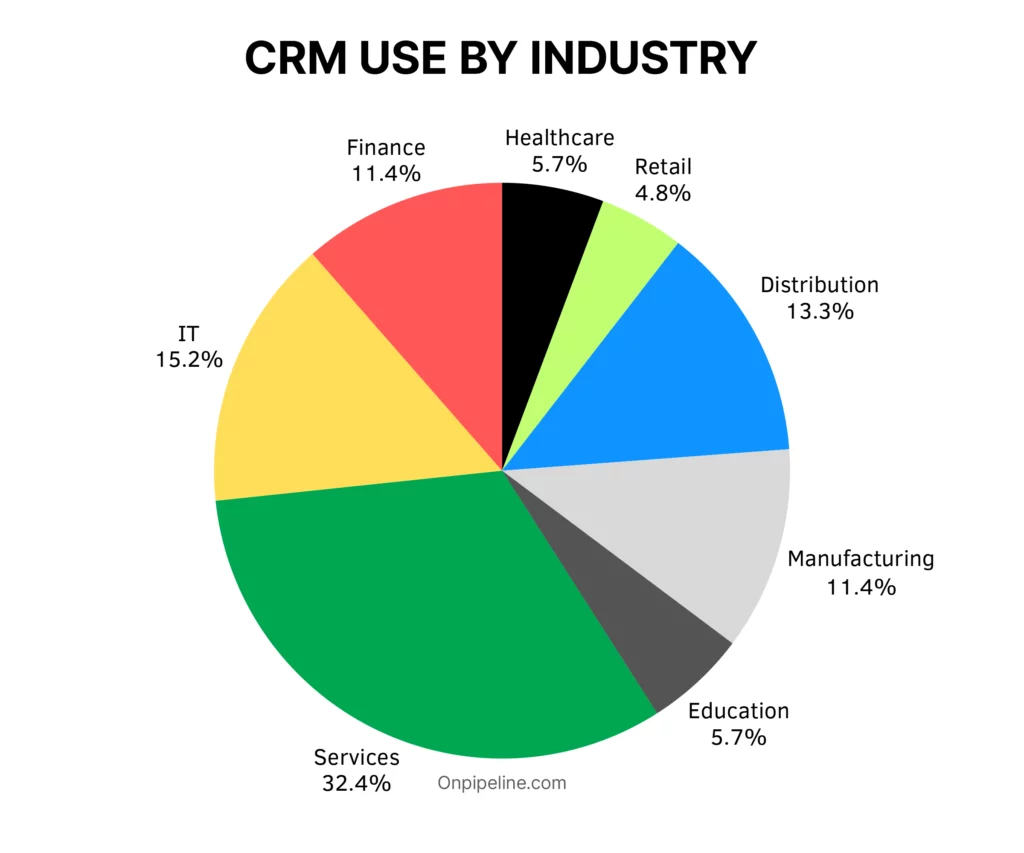
Survey conducted with SMEs across Europe, Latin America and the United States. It offers an indication quite close to reality regarding the current use of CRM software.
Free for 30 days!
No contract and no credit card required. Fully operational account. You can try and confirm the same settings by placing an order, or simply let the trial period expire.
Start todayCloud-based
A cloud-based software is a tool or platform that you can use over the internet. Instead of installing the tool on your computer, it runs on powerful computers in data centers. This means you can access and use the service from anywhere, as long as you have an internet connection.
The same information to anyone from anywhere
Onpipeline offers a cloud-based system. This system allows people to access shared data no matter where they are.
Sales teams can quickly review and update data after meetings, making it easier to respond promptly. All organization members can easily find shared information, so they can work remotely and collaborate efficiently.
Cloud-based solutions have several benefits. One advantage is that you don’t have to install software on many devices. Moving data, software, and services online can improve CRM for all organizations.
Cloud-based CRM platforms, such as the one offered by Onpipeline, facilitate universal access to shared data regardless of geographical location.
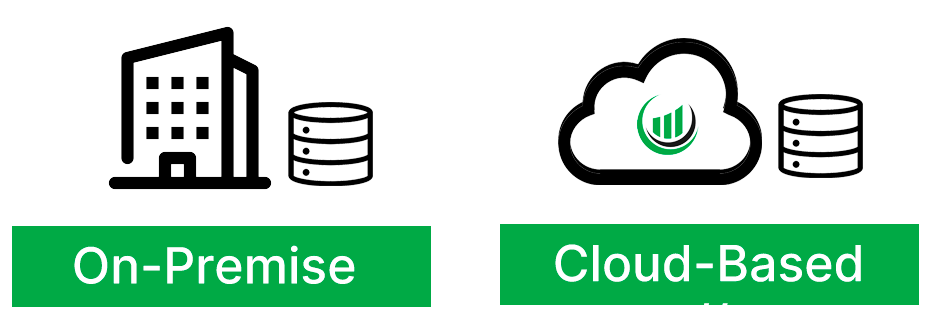
Low cost
Implementing CRM is a breeze and doesn’t call for any special installations or hardware. This helps keep your IT costs in check and removes the hassle of handling updates and versions. Cloud-based services usually charge based on the number of users and features required.
This route is cost-effective and flexible, making it easy to add more users as your business grows. Onpipeline is even more flexible because it can be customized to suit your needs. You only have to pay for the features that are important to you.
What CRM can do
CRM systems excel at managing and tracking interactions, giving an edge over spreadsheets. They are great at managing complicated data like emails, activities, and purchase history. This keeps your data fresh and actionable. CRM software has features like lead scoring.
Lead scoring evaluates and prioritizes leads based on activities and engagement levels. This helps sales teams focus on the most promising prospects.
What CRM can’t do
Despite their versatility, CRMs have their limitations. These systems aren’t designed for tasks like production, warehousing, shipping, engineering, or finance.
These systems rely on the visibility of data; if leads or deals are handled outside its effectiveness diminishes. Some software manages data, but it can’t replace specialized tools in all business areas.
CRM Categories
CRM systems can be categorized based on their primary functional focus, such as sales, marketing, and customer support. Here’s a breakdown:
Sales CRM
This type, like Onpipeline, is tailored specifically for sales teams. The software helps with sales management. It tracks customer interactions and leads to closing deals. Sales CRM systems usually have tools for managing contacts, predicting sales, and tracking performance. These tools help sales teams improve their strategies and work more efficiently.
Marketing CRM
Marketing features are designed to support marketing teams. They specialize in campaign management, lead generation, segmentation, marketing automation and tracking customer engagement. These systems help automate marketing tasks, personalize messages, analyze campaign results, and understand customer preferences. This allows for more effective marketing efforts.
Customer Support CRM
These systems concentrate on customer service and support. They help manage customer inquiries, complaints, and service requests, ensuring timely and effective resolution of customer issues. Features often include ticketing systems, customer feedback management, knowledge bases, and self-service portals. The aim is to make customers happier and more loyal by offering great customer service.
CRM Features
If we’re discussing CRM in its strict sense, the main activity is sales, which is the goal of customer management. A sales CRM helps you manage important things like contacts, customers, sales processes, and interactions.
Sales CRM
A CRM system for sales is designed to optimize and improve the sales process.
It usually includes contact management and lead segmentation, information that is then shared with marketing. So, we can say that a CRM for sales is not an isolated compartment but includes more or less advanced functionalities that can also be used by marketing.
- Contact and Relationship Management: Maintains a detailed database of customers and potential customers, allowing salespeople to easily access information such as contact details, interaction history, and preferences.
- Management of Sales Opportunities (Deals): Helps track and manage sales opportunities at all stages of the sales funnel, from lead generation to closing the deal.
- Sales Process Automation: The system automates repetitive tasks, like lead assignment and email sending. Salespeople can focus on important tasks.
- Reporting and Analysis: You can use these tools to analyze and report sales performance. They help you identify trends and make sales forecasts using historical data.
- Integration with other tools: CRM systems can work with other tools like email marketing software, e-commerce platforms, and accounting systems. This makes the sales process more organized and connected.
- Sales Processes (Pipeline): This tool makes sure that sales processes are consistent and follow the company’s best practices.
- Quotes and Orders: You can make, send, and track quotes and orders. This simplifies sales and reduces errors.
- Shared Access: Everyone in the company can view the same customer information, which improves the customer experience. Having the information at hand without having to ask the customer makes us much more efficient and professional.
To the main business activity – sales – we must then add the activities that are complementary and supportive of sales, those activities that then create true management and versions of CRM.
We are talking about Marketing and Customer Support. Later we will see – in simple words – what a CRM does for Marketing and what a CRM does for Support.
Marketing CRM
A CRM for the marketing department has a basic functionality and is to categorize and analyze customers based on different criteria such as demographics, purchasing behavior, and interaction history.
It helps personalize and manage marketing campaigns. It allows you to plan, execute, and track marketing campaigns across various channels, such as email, social media, and online advertising.
These features help with marketing, attract customers, and boost sales and loyalty.
- Customer Segmentation: You can use this feature to separate your customers into different groups. You can do this based on things like their age, what they have bought before, and how they behave. Effective segmentation leads to more targeted and personalized marketing campaigns.
- Campaign Management: Marketing CRM tools help plan, execute, and track marketing campaigns on various channels like email, social media, and web ads. This helps in assessing the effectiveness of each campaign.
- Lead Management: We track potential customers (leads) from the first point of contact until they convert. It helps in understanding which leads are more likely to become customers.
- Email Marketing Integration: Marketing CRMs often include email marketing tools. These tools let you send targeted emails and track their performance. You can also analyze open and click-through rates for your email campaigns.
- Social Media Management: Some CRMs can manage social media interactions, keep track of mentions, and interact with customers.
- Marketing Analytics: This tool helps you see if marketing campaigns are successful and helps you make better choices based on data.
- Event Management: Helps in organizing and tracking marketing events, webinars, and other customer engagement activities.
- Content Personalization: We use customer data to personalize marketing content. This ensures that our messages are relevant to the audience’s interests and needs.
- Integration with Sales: A good marketing CRM works well with sales and customer service CRMs. It shows the whole customer journey and helps different departments work together.
Customer Support CRM
A CRM software (used for customer support offers a series of essential functionalities to manage and improve post-sale interaction. The main functions are to track and manage customer support requests.
This includes recording tickets, assigning them to team members. This CRM can automate standard responses to frequent questions and help filter and forward tickets to the most suitable employee to handle them.
Caution with all-in-one solutions
CRM solutions that handle sales, marketing, and customer support may not specialize in each area. CRM systems made for sales or marketing have advanced tools that match team preferences and processes. Setting up and integrating different software may take longer and require more effort. However, it usually brings better long-term benefits for operations and business.
Onpipeline focuses on sales and marketing management with tools to optimize the sales process. Although it has features for marketing, like customer segmentation and bulk messaging, its main focus is on sales. This specialization ensures that Onpipeline excels in its core area, sales management, rather than diluting its effectiveness by trying to cover too broad a range of functionalities.
Choosing the right CRM
Identify Your Needs: Understand what you want the platform to achieve for your business, such as improving customer relationships, automating sales processes, or enhancing marketing efforts.
Budget Considerations: Determine what you’re willing to spend. There are many systems to choose from. Some are affordable and have basic features, while others are more comprehensive and expensive.
Usability and Integration: Look for a platform that is user-friendly and can easily integrate with your existing tools (like email, accounting software, etc.). This ensures a smoother transition and more efficient workflows.
Scalability and Customization: Select a solution that can adapt to your business and can be customized to fit your specific processes and needs.
Security and Support: Ensure the software provider provides robust security features and reliable customer support.
Finally, taking advantage of free trials or demos can be invaluable in making an informed decision. This hands-on approach allows you to test the CRM’s compatibility with your business operations before committing
Do you need a CRM?
If you want to manage sales and build customer relationships, you need insights about your leads and customers. Implementing a CRM helps you understand your sales team’s performance. It also ensures smooth interaction between customers and different departments in your organization.
Onpipeline™
It’s cloud-based sales CRM with marketing tools. Users can access all of its features without having to install any hardware or software on their computer. The customer can be up and running in hours! You can try for free
With Onpipeline, you can manage deals, sales pipelines (*), sales activities, contacts, leads, opportunities, and forecasts. Onpipeline works in several industries like Healthcare, Financial Services, Wholesalers and distributors, Manufacturing, etc.
* A sales pipeline is a series of stages that a prospect goes through. Once certain tasks are completed, the prospect moves on to the next stage. This is similar to a sales process, which refers to the actions sales reps take for each lead (e.g. qualifying them with a phone call, sending proposals, etc.).
Free for 30 days!
No contract and no credit card required. Fully operational account. You can try and confirm the same settings by placing an order, or simply let the trial period expire.
Start todayFrequently Asked Questions
In Brief: What Exactly is a CRM?
In simple terms, a CRM (Customer Relationship Management) is like an organizer for businesses. It keeps track of all the important information about your customers and helps your team work together smoothly.
It’s like having a helpful assistant that remembers who your customers are, what they like, and what you need to do for them.
With a CRM, you can keep everyone on the same page, provide better service, and make your business more successful.
What are the Top Benefits of using a CRM?
Using a CRM platform can bring a host of advantages to your business.
- it keeps all your customer information organized in one place, making it easy to access and update.
- it boosts your team’s collaboration by allowing everyone to see the same customer details and interactions.
- it enhances customer service as you can respond to inquiries faster and with accurate information.
- it tracks your sales activities, making it simpler to spot trends and make informed decisions.
- it improves customer retention by helping you stay connected and provide personalized experiences. All in all, adopting a CRM system can revolutionize the way you do business, leading to increased efficiency and customer satisfaction.
Is a CRM worth It? Cost vs. Return on Investment
Many businesses wonder if it’s worth investing in a CRM system. Implementing and maintaining a CRM costs money, but it usually pays for itself in the long run.
A well-implemented CRM streamlines processes, enhances customer interactions, and boosts sales efficiency. This results in saved time, reduced errors, improved customer retention, and increased revenue.
Although the initial investment may be intimidating, a CRM can benefit your business.
What are the types of CRM?
Operational CRM: Focuses on streamlining the day-to-day operations of sales, marketing, and service departments. It helps manage customer interactions by automating and improving customer-facing processes.
Analytical CRM: Specializes in analyzing customer data to gain insights into customer behavior and preferences. This CRM provides helpful information about customers and trends for making important decisions.
Collaborative CRM: Aims to enhance communication and collaboration among various departments and stakeholders. The company shares customer information with different business units. These units include sales, marketing, and customer support. Sharing information helps create a unified approach to customer relationship management.


